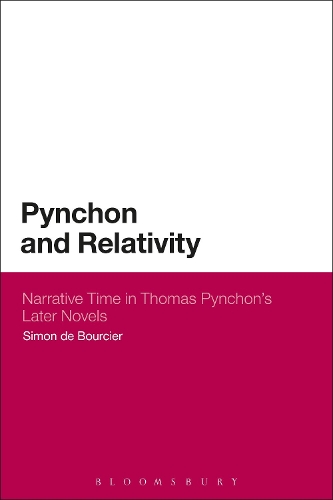
Pynchon and Relativity: Narrative Time in Thomas Pynchon's Later Novels
(Paperback)
Available Formats
Publishing Details
Pynchon and Relativity: Narrative Time in Thomas Pynchon's Later Novels
By (Author) Dr Simon de Bourcier
Bloomsbury Publishing PLC
Bloomsbury Academic
24th November 2013
United Kingdom
Classifications
Tertiary Education
Non Fiction
Literary studies: c 1900 to c 2000
813.54
Physical Properties
Paperback
240
Width 156mm, Height 234mm
345g
Description
Is time an illusion Do past, present, and future co-exist in a timeless whole, or are our experiences of change and duration the reality of time Thomas Pynchon's writing has always been interested in the interplay of these two ways of thinking about time, but his recent fiction has also taken on the task of imaginatively responding to Einstein's Theory of Relativity, which in the early years of the twentieth century renewed this ancient debate. In this book, Simon de Bourcier looks in detail at Pynchon's 2006 novel Against the Day, which is set during the period in which Einstein published his world-changing theory, and 1997's Mason & Dixon, set in the eighteenth century when Isaac Newton's picture of a world governed by absolute space and time was unchallenged. By comparing these two novels, Pynchon and Relativity shows that Pynchon's tales of loss, haunting, and time travel are informed by a sophisticated awareness of the philosophical implications of Relativity. The book goes on to examine the consequences of this for our reading of Pynchon's other work.
Reviews
"Inits consideration of time in all of Pynchon's novels from V. to Inherent Vice, thiswide-ranging study deservedly takes its place in the best tradition of Pynchoncriticism, moving with ease between literary criticism, philosophy, history andthe natural sciences. In particular, the book's elaborate reading of Against the Day is groundbreaking, andthis profound pioneering work makes Pynchonand Relativity a monograph no future analysis of that novel can afford to ignore." -- Sascha Phlmann, Assistant Professor at Ludwig-Maximilians-University, Munich
Author Bio
Simon de Bourcier has a degree in English from Trinity College, Cambridge, an MA in English Studies from Anglia Ruskin University, and a PhD from the University of East Anglia, where he has also taught as an Associate Tutor.
